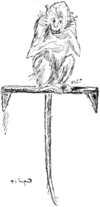Dinner at the Zoo.
 HE place, the Zoological Gardens. Time, nearly half-past two. The visitors, having been deprived of their shillings by the man at the gate, make a bold push for the pelicans enclosure, for 2.30 is the pelican dinner-hour. A pelican who is not eating is commonly a melancholy sort of bird, with a conviction that too much of his leg material has been used up to construct a beak, and a disposition to brood over the inequitable distribution of things. But dinner-time works a marvellous change in the pelican. His beak isn't half big enough then, and he would gladly, if he could, add a yard of material to the floppy pouch hanging beneath it. When the keeper arrives with a basket of fish, the casual observer sees little in the enclosure but a complication of very large beaks, like snapping shears, which bite, snap, flop, grunt, and become entangled together generally. But the budding Progognomist observes the varying actions of those beaks. He views the floppy pouches with discretion and the stumpy legs with judgment. Consider the corner enclosure, now. Here there are white pelicans (it is more majestic to call the white pelican Pelecanus onocrotalus) with one specimen of the crested pelican, whose Latin name is not so many feet long. As the keeper opens his basket, and when most of the beaks snap wildly in the air,
HE place, the Zoological Gardens. Time, nearly half-past two. The visitors, having been deprived of their shillings by the man at the gate, make a bold push for the pelicans enclosure, for 2.30 is the pelican dinner-hour. A pelican who is not eating is commonly a melancholy sort of bird, with a conviction that too much of his leg material has been used up to construct a beak, and a disposition to brood over the inequitable distribution of things. But dinner-time works a marvellous change in the pelican. His beak isn't half big enough then, and he would gladly, if he could, add a yard of material to the floppy pouch hanging beneath it. When the keeper arrives with a basket of fish, the casual observer sees little in the enclosure but a complication of very large beaks, like snapping shears, which bite, snap, flop, grunt, and become entangled together generally. But the budding Progognomist observes the varying actions of those beaks. He views the floppy pouches with discretion and the stumpy legs with judgment. Consider the corner enclosure, now. Here there are white pelicans (it is more majestic to call the white pelican Pelecanus onocrotalus) with one specimen of the crested pelican, whose Latin name is not so many feet long. As the keeper opens his basket, and when most of the beaks snap wildly in the air, 
"The beaks snap wildly."
our crested friend uses his own beak to belabour the heads and snatch at the eyes of those about him. The worthy old fellow objects, and very naturally, to anybody getting anything to eat but himself; so he wastes his time and loses his opportunities in attempts to chevy his relatives away from the fence, one at a time. Then, when herrings fall in a silvery shower his time is so much occupied in punishing those who catch them that his own score must average rather low. Progognomically, it is reasonable to say that if that crested pelican had been born human he would have been a reviewer—a super-fine reviewer. Among the other common, scrambling, uncrested pelicans, most, in waiting for the herrings, reach away over the fence, snapping and gobbling madly at nothing. One, however—sly old fellow, with one eye shut—stands quietly behind with his other eye on the keeper and waits. He knows that the keeper will throw the bloaters into the enclosure, not a yard or two on the other side of the fence, where the row of straining necks puts forth the bill file—or rank, as you look at it. He is right, and, in consequence, comes several bloaters ahead. This pelican need never fear transmigration into human shape. He will do well anywhere. The herrings having all disappeared, gloomy
